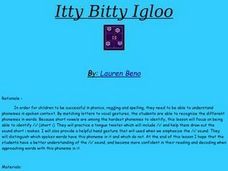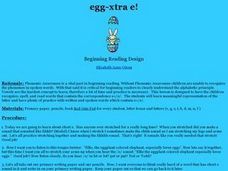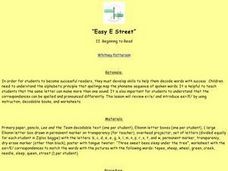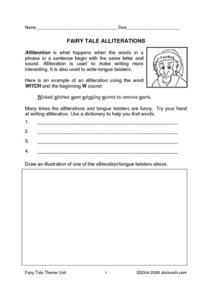Curated OER
Opera Singer
Students recognize the short vowel o in written and spoken language. Through listening and decoding activities, they discriminate the vowel sound /o/ from other phonemes. Students identify the phoneme and letter in pseudo words they read.
Curated OER
"Mmmm... Yummy to My Tummy!"
Students answer a series of question about different letter sounds. They verbally practice the sounds of each letter following set responses. They write the different letters and find words that start with that letter.
Curated OER
Adam's Apples
Students examine the /a/ phoneme in both written and spoken words. They practice finding the /a/ in words, watch how their mouths move when making the sound, and write the letter. Next, they differentiate the sound in words, listen to a...
Curated OER
Itty Bitty Igloo
Students recognize the short vowel i in written and spoken language. Through listening activities, they discriminate the vowel sound /i/ from other phonemes. Students associate the phoneme with its letter representation and identify the...
Curated OER
The Fat Cat
Pupils explore phonemes. They identify that a=/a/. Students recognize /a/ in spoken words by learning a meaningful representation and a letter symbol. Pupils practice finding /a/ in a variety of words. Students read a book that focuses...
Curated OER
A Baby is Crying...Aaa!
Students explore phonemes. They discuss the phoneme /a/ (short a). Students read and write words containing the phoneme /a/. They identify /a/ in written and spoken words. Students recognize the letter symbol for /a/ and find words with...
Curated OER
O-O-O-O-O, I get it!
Students engage in an emergent literacy lesson that focuses on the skill of phonemic awareness. To practice the skill the phoneme for the letter "o" is used. The students need to recognize the letter and its corresponding sound.
Curated OER
Chicka, Chicka, Choo, Choo
Students begin to read and spell words vis phonemes and letter correspondences. They encounter the concept digraph. This lesson plan helps the students see a c and h together, they make the ch sound. So, that the students recognize this...
Curated OER
Cat Nap
Students identify and interpret the concept of the vowel /a/ and recognize it in words and illustrations. They also practice writing both upper and lower case A on writing paper. Finally, students name pictures and circle the pictures...
Curated OER
Vowel Sounds - Short Aa Words
In this short "Aa" worksheet, 1st graders use the number code and find the letters for each number to spell out the small words. Students spell 20 words.
Curated OER
Egg-xtra E!
First graders recognize the short vowel e in written and spoken language. Through listening activities, they discriminate the vowel sound /e/ from other phonemes. Students identify the phoneme and letter in words and sentences they write.
Curated OER
Language Arts: Understanding Phonemes
Young scholars discover the relationship between letters and phonemes. The teacher leads an oral demonstration of pronunciation and focus on the /a/ sound. Next, students examine a series of pictures, circling the ones where they hear...
Curated OER
Eddie the Elephant
Learners need to practice sight words to become proficient readers. So it is very important for children to learn common correspondences. The phoneme for the letter "e" is practiced in this lesson plan.
Curated OER
"Easy E Street"
Students investigate how the same letter can make more than one sound. It is also important for students to understand that the correspondences can be spelled and pronounced differently. This lesson will review e=/e/ and introduce ee=/E/...
Curated OER
phoneme awareness
Young scholars focus on the sound of the /ch/ digraph before recognizing it in both written and spoken words. They study the poster that says "Chugga Chugga Choo Choo!" to find they /ch/ phonemes. They write the letters before...
Curated OER
Let's Help the E Out!
Students explore the short /e/ sound. They practice making the sound, noticing how their mouths move to make the sound. They use letterboxes to spell and write 'e' words. They listen for the /e/ sound in a story and then write their own...
Curated OER
What doe the doctor say?
Young scholars must explore the phoneme awareness. They must decode many different correspondences. Students explore the o sound by illustrating the concept using memorable tools used in by showing the o sound in spoken and written words.
Curated OER
Camels Theme Unit
In this Camel themed instructional activity, learners create an alliteration, an acrostic poem, and work with similes. The unit consist of three pages of language arts work, based on Camels.
abcteach
Dragon Alliterations
You don't have to slay the dragon in this activity. Young writers review poetic devices with a set of worksheets about alliteration and similes. Once they finish waxing poetic about their dragon friends, they craft a final...
Curated OER
Aaaa! It's A!
Exercise phonemic awareness of the vowel /a/ to help children become successful readers. They connect spoken phonemes to written grapheme's and create a relationship between the vocal gesture of /a/ and its grapheme map in text and words.
Curated OER
To Make a Cake you must say /A/
Here is a great way for learners to practice identifying sounds made by both short and long vowels. This lesson stresses the a_e=/A/ correspondence along with letterboxes. They read their spelled words, whole text selection and...
Curated OER
Let Us Rhyme With Madeline
Listen to the book Madeline, and identify rhyming words with learners as they hear them in the book. Learners will engage in a class discussion about rhyming words. After listening to Madeline, they will circle pictures of words that...
Curated OER
Fairy Tale Alliterations
Fairy tales are the perfect way to focus on alliteration. Learners complete activities relating to alliteration and similes using a fairy tale theme. Then, they complete an acrostic poem using the words fairy tale.
Curated OER
Beat the Heat
Review common digraphs with your early elementary schoolers. They identify the digraph /ea/ in written and spoken language. After a brief discussion, they apply the rule for identifying and spelling words containing the /ea/ digraph....

























